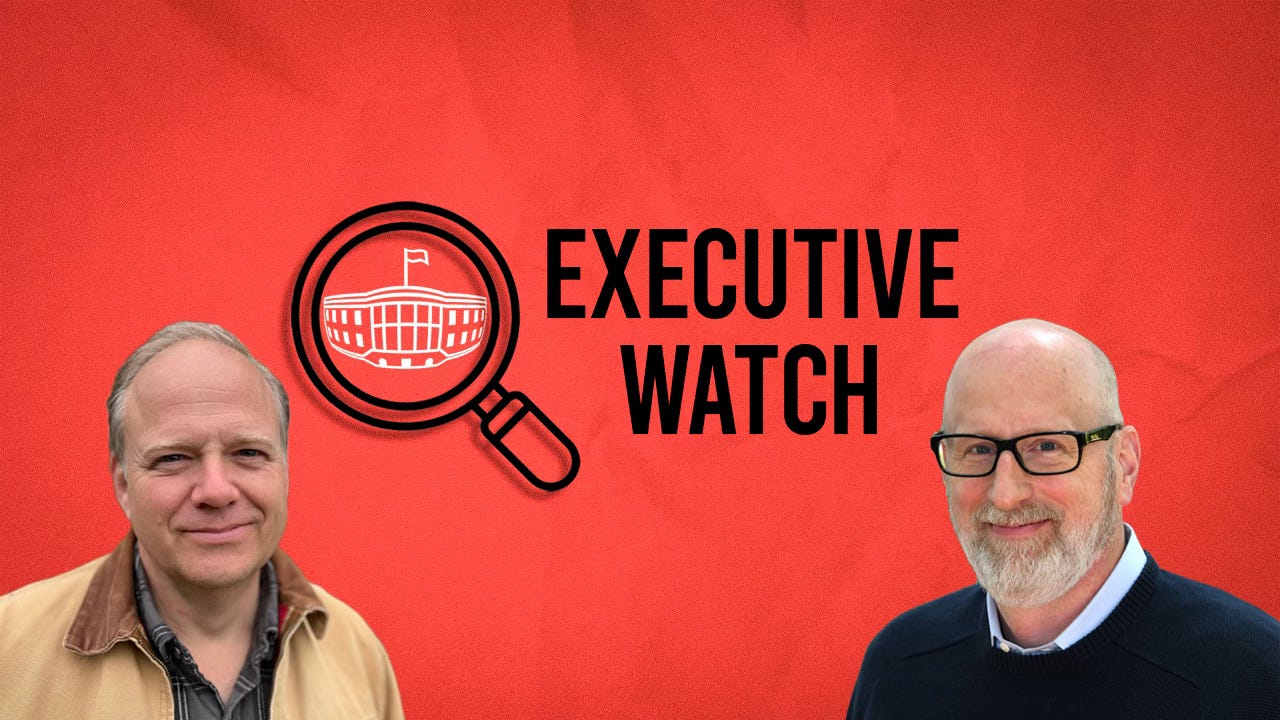Listen to Zooming In at The UnPopulist in your favorite podcast app: Apple Podcasts | Spotify | Google Podcasts | RSS | YouTube
Landry Ayres: Welcome back to Zooming In at The UnPopulist. I’m Landry Ayres.
In a post on Truth Social on May 2, President Trump promised to “[take] away Harvard’s Tax Exempt Status,” because, “it’s what they deserve!” While Trump may succeed in initiating such an action, our guest today doubts it will last, due to a long history of Supreme Court precedents regarding the tax code’s application to private institutions.
Speaking with the director of Executive Watch, Rob Tracinski, is New York Times columnist David French. They discuss the Trump administration’s hypocritical implementation of viewpoint diversity, the rushed and indiscriminate defunding of scientific research, and whether the social compact of government is based on the honors system of mutually assured destruction.
We hope you enjoy.
A transcript of today’s podcast appears below. It has been edited for flow and clarity.
Robert Tracinski: One of the reasons I really wanted to talk to you is I know that you spent a fair bit of your life doing litigation, doing work on freedom of speech, speech codes, religious freedom in the universities. So you’re somebody I really wanted to talk to about what’s going on right now, especially with Columbia, with Harvard, with the Trump administration trying to exert this power over the universities.
Drawing on that history, what are the legitimate complaints against the universities? And then we can look at what the Trump administration is doing and whether that’s a legitimate answer to it.
David French: Yeah, this is a great question. Let me start off with a kind of weird hypothetical. You have somebody and they’re caught on video holding up a convenience store. They grab a bunch of cash from the register. They grab a bunch of cigarettes from behind the counter, or whatever, and they dash out. And then after they dash out, two or three days later, somebody, a police officer, just sees them and shoots them dead on the street. And you go, “Whoa, wait, you can’t do that.” And he says, “What are you talking about? I saw them robbing a convenience store on video a few days ago.”
Now, we recognize the obvious problem here, right? If somebody has robbed a convenience store, the punishment for that is not summary execution. Even if they’ve been caught on tape, you have to have a trial. And then the punishment has to fit the crime. Stealing $500 and some Marlboros is not worth the death penalty. So the punishment has to be proportionate to the crime.
And to argue that you can’t summarily execute a robber is not to say that the robbery was OK, that the robbery was fine. So you’re going to start to see the analogy here.
Tracinski: And by the way, this is not entirely hypothetical. There was a case in Missouri a number of years ago where a young man was shot by a police officer. And they did actually have footage of him robbing a convenience store. But the two things were not connected. The case did not hinge on that. But people used that as an excuse to say, “Well, he deserved to be shot.”
French: Exactly. So, for years, universities have been suppressing the free speech rights of dissenters on campus—mainly on the right, sometimes on the left, but for years they’ve been doing this. After October 7, a number of universities utterly failed to protect Jewish students from harassment. And sometimes university employees even participated in the harassment or stood by—literally stood by—while it was happening. These are egregious wrongs. All of them have a lawful remedy.
So, for example, when schools violate the First Amendment, you can sue the school. I did that so many times. I used to like to say, when I first left the practice of law and started working as a journalist, that at that time I’d probably sued more universities than any other lawyer in America. I did it so many times. There was a legal remedy. If they violate the rights of Jewish students by permitting antisemitic harassment on campus, there is a legal remedy, a legal process for that.
What is happening is the Trump administration is skipping to the summary execution part. They’re looking at this record that does exist of university misconduct and imposing an extraordinary draconian penalty without due process, without following through on the right processes, without tying the punishment to the offense. So it’s a very similar analogy.
Tracinski: Also I think what they’re asking for is not merely a remedy—because they’re using antisemitism as this sort of excuse. The remedy they’re asking for is not a remedy for antisemitism per se. It goes much wider.
I just wanted to quote the letter that the administration sent to Harvard:
By August 2025, the university shall commission an external party which shall satisfy the federal government as to its competence and good faith to audit the student body, faculty, staff, and leadership for viewpoint diversity such that each department, field, or teaching unit must be individually viewpoint diverse.
And anytime that’s found not to be the case: “[T]he university shall hire a critical mass of new faculty within that department or field who will provide viewpoint diversity, as well as admitting a critical mass of students who will provide viewpoint diversity.”
So this isn’t: “Oh, you did some bad things—we want to correct that.” This is asserting, basically, a government overseer who’s going to control hiring and admissions. And when they say “viewpoint diversity,” everybody knows the universities are biased towards the left, that most of the professors lean center-left to far-left. So what this really means is we’re going to appoint an overseer who’s going to force you to hire conservative professors and admit conservative students.
French: Right. And look, I have long been an advocate for greater viewpoint diversity in higher education. I think it is a problem if you have entire fields where it’s very difficult to find, not just a conservative voice, but often even a moderate voice. In some entire fields, it’s very difficult to find centrist people, much less conservatives. So I’ve long advocated viewpoint diversity.
I also know that institutions have their own academic freedom. So what I’m making is a policy argument, a moral argument. The university, though, and in particular a private university like Harvard, has the ability to say, “This is the perspective we want to advance in the context of our own academic freedom.”
And if you think that’s a problem, let me refer you to the Council of Christian Colleges and Universities. So, you have hundreds of Christian colleges around the country. They don’t have viewpoint diversity in many of them, especially in areas of religion. You can scour through the ranks of faculty members at Christian colleges, and you won’t see Jewish faculty, Muslim faculty, atheist faculty, for example. I ask you: Do you want the federal government to intervene and say, “We’re going to cut off your access to Pell Grants? We’re going to cut off your access to the GI Bill? We’re going to cut off your access to research funding? Unless, Christian university, you hire more Muslim faculty?” Conservatives would be outraged by that.
Same principle applies. So, yeah, you can have a problem with the fact that Harvard is way unbalanced ideologically, but then to use the force and power of government to tell them what is the proper ideological balance, that’s not the government’s business. It is not a matter of government control to tell a private institution, you have to have more conservatives or more liberals.
And this is not hard stuff. This is not graduate-level First Amendment. This is First Amendment 101 here. Which is one of the reasons why the Trump administration has been pitching an unbelievable fit about all of the injunctions entered against it. And they’re calling it judicial tyranny and all of that.
I mean, they’re breaking the law a lot, and they’re doing it very blatantly. They’re not hiding the ball on this stuff. They are saying: “We’re going after you because you hired this person,” or “we’re going after you because you harbor this point of view,” or “we’re going after you because you help Democrats in this way” (going back to some of the law firms).
So, yeah, of course, they’re going to get enjoined. A first-year attorney at the lowest- ranked law firm in America could walk in with some of these Trump EOs, barely even file a brief, and a judge is going to see that and know that this is unconstitutional.
Tracinski: You’re bringing up religious schools. One example people have brought up in this regard, though, is Bob Jones University, which actually, I believe, had its tax-exempt status removed, or threatened, because it had an actual explicit pro-segregation policy.
French: Yeah. This case goes back to the early 1980s—Ronald Reagan’s first term, I believe.
So this is kind of an interesting story because some people claim this was actually the origin of the religious right. In the 1970s you began to have a series of private schools spring up around the country, and they’ve since been called “segregation academies.” Why were they called that? These were Christian schools—air-quote “Christian” schools—established so that white parents could send their kids to all-white schools after Brown v. Board and after the Civil Rights Act.
Tracinski: And this is, by the way, at the height of what we called “massive resistance” in Virginia, where they were actually shutting down schools rather than integrate them.
French: Right. So you had all these private institutions created that were racially segregated. And Bob Jones was hanging on, clinging on to elements of racial segregation, including bans on interracial dating, I believe. And so the IRS, beginning under the Carter administration and then moving into the Reagan administration, said, “You can’t be organized for a charitable purpose if you are engaged in explicit racial segregation. And we’re not going to give you a tax break if you are engaged in explicit racial segregation.”
This went all the way up to the Supreme Court. The Supreme Court, in an opinion that really has been, since that time, basically confined to its facts, held that, yeah, if you’re racially segregationist, you can’t have the tax exemption.
OK, so what does that case mean? I’ll tell you exactly what it means, Rob. It means if you’re explicitly racially segregationist, you cannot get a tax exemption. Period. That’s it.
It does not mean that if you enact a policy that the government doesn’t like that you cannot get a tax exemption. And why do I know this? I represented dozens of Tea Party groups that had delayed tax exemption applications during the Obama administration. And we filed suit successfully against the Obama administration as a result of these systematic delays imposed on Tea Party groups and approving tax exemption applications. At no point was there the slightest doubt in these legal proceedings that, if we could prove political retaliation, we wouldn’t prevail in the case, that political retaliation in connection with a 501(c)3 grant is absolutely out of bounds.
“So, you have hundreds of Christian colleges around the country. They don’t have viewpoint diversity in many of them, especially in areas of religion. You can scour through the ranks of faculty members at Christian colleges, and you won’t see Jewish faculty, Muslim faculty, atheist faculty, for example. I ask you: Do you want the federal government to intervene and say, ‘We’re going to cut off your access to Pell Grants? We’re going to cut off your access to the GI Bill? We’re going to cut off your access to research funding? Unless, Christian university, you hire more Muslim faculty?’ Conservatives would be outraged by that.” — David French
If you are a nonprofit, you’re going to have real trouble getting a tax exemption if you enact racially segregationist policies. And part of this is simply a matter of our unique racial history. One of the purposes of the 13th, 14th, and 15th Amendments, along with the Civil Rights Act, was to remove what are called “the badges and incidents of slavery.” And explicit racially segregated policies are part of these badges and incidents of slavery.
Now, I’m not even sure, Rob, that the Supreme Court would decide Bob Jones the same way today. It has become even more protective of free speech and free association than it was in the early 1980s. So it may not decide it in the same way that it did.
But one thing I absolutely know is applying a political litmus test to 501(c)3 organizations is going to be a no-go.
Tracinski: The other thing I noticed is that one of the big threats they’re using, the stick for the carrot that they’re using against the universities, is cutting off funding. But I find it interesting that a lot of the funding they’re cutting off is scientific funding. One misunderstanding is people think all this woke stuff is all being funded with federal grants. And actually relatively little of it is being funded directly with federal grants. They’re going after the science funding because that’s where the money is actually going in. They’re going after the sciences to hit the humanities.
French: It’s interesting because if you’re going to look at actual federal funding of universities, it tends to come through a few channels. One huge one is through the students themselves—so, in other words, the GI Bill, Pell grants, things like that that the student kind of carries the funding with them. If they are eligible for the federal program, they get the access to the federal funds, and the federal funds go to the school.
For example, I teach at a small private Christian college. Well, not so small anymore, we’re growing. And we have students here on the GI Bill. So that means, technically, my Christian college is federally funded because we have students receiving the GI Bill, Pell grants, and other things attending here.
So a big chunk of federal funding actually comes through the students. And if you try to pull the GI Bill from students who are, say, attending a Harvard or Brown or Yale, that would be very politically unpalatable. Good luck with that. Well, what is the other funding coming from? It is not the case that the federal government is, as a general matter, writing billion-dollar checks to the women’s studies department at Oberlin to be woke. That’s not what’s happening. Enormous amounts of federal funds are channeled through research grants, just giant amounts.
In our system, we do not vacuum all significant research through official government employees and through official government agencies. We actually allow for a lot of research to take place in private institutions through federal funding. Especially if you have major research institutions like, say, Vanderbilt, where I live, or Harvard, or Northwestern, where you don’t just have a research institution. You often have medical schools with medical research as well.
So giant amounts of federal funding are actually flowing through to research things like cures for pediatric leukemia, advances in artificial intelligence, in robotics. This is where an enormous amount of that research goes. And so do you yank the robotics research because the women’s studies department discriminated against male students? Those two things are not connected to each other.
A lot of times what you see is that schools that have done actual wrong things—they have, for example, failed to protect Jewish students—are actually receiving punishment in a way that is eliminating the jobs of the people who are totally innocent of all of that and completely disconnected from it. I was just talking today to an infectious disease researcher who is losing funding related to research on potential new and emerging coronaviruses. Why? Because they were at an institution that was accused of failing to respond to the encampments in the right way. Well, those two things have nothing to do with each other.
Tracinski: I’m wondering if it’s partly because they were researching coronaviruses, and Trump blames Covid for not getting reelected in 2020.
Another thing they’ve targeted is immigration. They’ve done three things with Harvard: “We’re going to cut off your research funding”; “we’re going to threaten to remove your tax exempt status,” and “we’re going to remove your ability to be a sponsor for international students.”
And there’s also been this wider clampdown. There was a case at Brigham Young where a guy had an infraction on his fishing license, and I think they reinstated him, but they were going to tell him he had to end his student visa. But also anybody who spoke out against Israel or participated in any tangential way with the protests, they’re taking away their visas.
We talk about what’s going to happen to the scientific research programs, but also the effect on those programs of having international students being taken away from them.
French: The other interesting thing is they’re essentially saying to Harvard—I mean, this administration is punitive and incoherent and incompetent all at the same time—“You’ve got to have viewpoint diversity. You’ve been viewpoint discriminatory.” And then they’re saying, “Well, you’ve got to be viewpoint discriminatory against these foreign students.”
Well, make up your mind here. What is the problem? Is the problem viewpoint discrimination? Is it viewpoint neutrality? What we are seeing is just a lot of incoherent demands. When you come to foreign students coming to the U.S., their free speech rights do not really attach until they’re here. So the First Amendment doesn’t just protect citizens, it protects persons, but it does not protect a person in Estonia, in Bangladesh, in Indonesia. But it does protect an Estonian, a Bangladeshi, an Indonesian in the U.S.
And that creates complexity. So how much control do you have on the front end, keeping people from coming here, versus once they’re already here? For example, elements of Trump’s Muslim ban, which wasn’t really a Muslim ban, but a ban on immigration from specific countries, was upheld—even against some constitutional challenges relating to the First Amendment and the Establishment Clause. Because what you’re talking about, in part, was that you have people who, if you’re in Iran, you do not possess American free speech rights. If you’re an Iranian in America, you have free speech rights. So that ambiguity creates some complexity.
But I do not believe at all that the government can impose on students who are already here a requirement that they not dissent from the government’s point of view on matters relating, for example, to foreign policy. The Supreme Court would have to reverse some case law to do that.
Tracinski: Also a lot of the attraction of having international students come here is they come because they know this is a place where they’re going to be free. If you’re coming here from Iran or from Turkey, the fact that you have greater freedom of speech is one of the attractions of coming here.
French: Oh, totally! I mean, think of it like this, Rob. Imagine a classroom, and they say, “OK, we’re talking about Israel and Gaza. And anybody can say anything about this except Israelis or Gazans.” Are you getting a good educational experience? Is that the educational experience that you should have? You get to hear from everyone except the people who are experiencing the reality on the ground. That’s insane.
Tracinski: And is that viewpoint diversity?
In a way, that Trump’s skill is he has this amazing ability to probe all weak spots in the American political system, and every time they find a crack they just shove everything they can right through that crack to try to widen it up a little bit.
One of the things I’ve noticed is that there is a certain degree of history here—as you said, the Constitution has all these clauses that say “no person.” For example, due process: “No person should be deprived of due process.” It doesn’t say “no citizen.” It says “no person.” But there’s been this sort of legal history where it’s been interpreted as if it said “no citizen” and that immigrants have fewer protections, at least in practice, than legal residents or especially than citizens do.
French: This is black letter constitutional law. The Fifth Amendment and the 14th Amendment both apply the due process protections to people, to persons. It’s not as if the Founders didn’t know how to write something to protect citizens, because the same 14th Amendment that protects the rights of due process of persons protects the privileges and immunities of citizens.
Persons in the U.S. have the protection of the Constitution in certain concrete ways. Now, not all ways, but in certain concrete ways. And so the question then becomes when a person who possesses constitutional rights is also maybe in the status of an illegal immigrant, that introduces a complexity, but it does not deprive them of their constitutional liberty. And this is actually not that complicated, believe it or not. If you are an illegal immigrant or alleged to be an illegal immigrant, you are entitled to a process before you’re deported.
“I was just talking today to an infectious disease researcher who is losing funding related to research on potential new and emerging coronaviruses. Why? Because they were at an institution that was accused of failing to respond to the encampments in the right way. Well, those two things have nothing to do with each other.” — David French
Now, it’s not a full jury trial, like if you’re being accused of a crime that could cost you time in prison. But if the question is your status, “Do you lawfully belong in the country?,” you’re entitled to due process on that point. And this has been the case forever. And it, by the way, it doesn’t mean that we can’t deport people.
Tracinski: The complexity is what the process is, not whether you have a process.
French: Exactly. And the process is not that complicated for deporting an alleged illegal alien. It is not that complicated at all.
If the Trump administration really wanted to do its job well and remove deportable illegal aliens, it has every tool at its disposal to do it. And all it needs to scale up is actually more resources, not new tools so much as more resources to hire more immigration judges to resolve asylum claims.
But guess what Trump did? He forced Republicans to block a bill in the final year of the Biden administration that would have granted much more resources to clear bottlenecks in the asylum process. But that got vetoed [i.e., blocked by Trump’s influence]. And instead of a law that could actually solve the problem, or go a long way towards easing the problem, you have a bunch of executive orders and unconstitutional practices that are going to be enjoined in court and create constitutional conflicts without actually accomplishing the policy objectives that MAGA claims to want to accomplish.
Tracinski: Well, I think he was concerned that if you created more judges to process asylum requests, they would say yes to some of them. In a sense, he wants to do this lawlessly. He wants to deport millions and millions of people, which is so overwhelming to the system that there’s no way you could do it—without throwing massive resources, there’s no way you could do it through a legal process.
French: Look, Donald Trump wants to possess Vladimir Putin’s tools. We don’t need to psychoanalyze whether Donald Trump wants to be Putin or whether he admires Putin or whatever.
Tracinski: Whether he has a daddy complex with Putin.
French: But he’s trying to create for himself the similar level of authority that Vladimir Putin has. And when you say that the violation of due process is kind of the point here: Yeah, absolutely. He does not want this due process to exist. And one way that you challenge the existence of due process is by denying it and then seeing what the courts say. And that’s the course of action he’s choosing.
And it’s very important to identify: Why did he invoke the Alien Enemies Act to deport these alleged gang members? He invoked the Alien Enemies Act because he’s trying to escape due process obligations. And it’s only been invoked during the War of 1812, when the British were powerful enough to burn our capital; it was invoked in World War I against imperial Germany; invoked in World War II against Nazi Germany and imperial Japan—existential threats to the U.S. Now he’s invoking it against a two-bit drug gang from Venezuela. And the reason is not because the two-bit drug gang from Venezuela offers a similar challenge to American sovereignty as Nazi Germany, imperial Germany, or much less the British Empire, but because he’s trying to unlock wartime power. That’s what he’s trying to do.
Tracinski: That brings me to a wider question, which is coming up in a lot of things, like what he’s doing at the FCC. About 100 to 150 years ago, there was a great expansion of government power in America. And it was done under the rubric of the old, 20th-century liberals who had this idea: “We want government to be much bigger. We want it to have much more regulatory power. We want it to be funding all sorts of things: The National Endowment for the Humanities, National Endowment for the Arts, the Kennedy Center, all these things. We want to be funding art and culture. But at the same time, we want people to be free.”
So they put various sort of guardrails, in some cases as law, in some cases as custom. They put various guardrails in place. “The FCC has the power to say whether your broadcast license is in the ‘public interest,’ but we’re going to have it be a bipartisan commission and try to limit its power so it doesn’t become tyrannical. Or we’re going to have government funding the arts and the humanities.”
I came across this in researching about federal architecture, because that’s another thing Trump wants to have control over: Back in 1962, Daniel Patrick Moynihan, who was a longtime senator, but at that point was an aide to Kennedy, wrote these Guiding Principles for Federal Architecture. He says architectural ideas, artistic ideas, should flow from the bottom up, from the profession up to the government and not from the government down to the profession. So they tried to create a lot of these guidelines and say, “We’re going to have government vastly expand its power and its funding and its reach. But at the same time, we’re going to have guardrails in place to make sure that that expansion of government power doesn’t become a tyrannical diktat from above.”
French: Another way of saying that is all is unfolding as libertarians have foreseen.
Tracinski: A good Star Wars reference, too. I like that.
French: The deal, the social compact, you articulated very well. Government is going to be a lot bigger. Government is going to have a lot more resources. It’s going to have a lot more capacity. But at the same time, through the development of regulations and rules and First Amendment case law, due process law, it’s going to be both big and tightly constrained. So don’t worry about this big thing. Don’t worry that universities are dependent on billions of dollars in federal funding to fully operate. Don’t worry about that, because that funding is entirely benign and helpful.
Why can you be sure it’s benign and helpful? Well, because we’re prohibited from using it in a way that discriminates against people. We’re prohibited from wielding it as a weapon to silence dissent. We’re prohibited from using this in a way that discriminates on the basis of religion. So it really is an even-handed, fair dispensation and disbursement of public funds. Don’t worry.
And a lot of people like you and I were saying, “Well, wait, when the government is that important to an institution, the government then begins to have de facto control of the institution and authority over the institution, even if it is saying, right now, we’re constraining ourselves.”
Trump is breaking that social compact. He’s saying, “Aha! Everything you worried about, about getting federal money, it’s coming real. Here I come. And the fact that I have that federal money, I have that power of the purse”—the president shouldn’t be exercising it, but he’s trying to take it—“the fact that I have the power of the purse means you have to do what I say. And good luck going to court about this, because maybe I’ll comply, maybe I won’t. And, in the meantime, while you’re fighting this out in court, you don’t have the money.”
Tracinski: The process is the punishment.
French: So we’re beginning to veer into some of the worst case scenarios that a lot of libertarians have been jumping up and down and talking about ever since. And I think that we’re learning the extent to which the American experiment depends on the honor system, in other words, people choosing to do the right thing versus being compelled to do the right thing. And that when you have somebody as powerful as a president who has no regard for the right thing, the law and the separation of powers are less effective than we might have thought at reining them in.
Tracinski: People have been saying that the Constitution depends on the honor system. I disagree with that. I think it depended on mutually assured destruction. The reason why nobody ever came in before and fired everybody on the Kennedy Center board and stacked it with his own guys is not because they just didn’t have the guts. It’s because they knew that, “Eventually, I’m gonna lose an election, the wheel’s gonna turn, the public’s gonna turn around, we’ll lose an election, and I don’t want the next guy to come in and fire all of my people and put all of his own people on.”
So we had these bipartisan institutions, and oftentimes not by law or statute, but simply by custom, because of that mutually assured destruction. The fact that it’s customary not to fire everybody who was on there, who the previous administration put on—that protects us so that when we’re out of power, we don’t get completely shut out and cast to the outer darkness.
Part of what concerns me is that the real compact Trump has broken in this constitutional respect is the mutually assured destruction. “Let’s grab all the power we can, assert everything, and dare anybody to stop us and not think about, ‘What precedents are we setting? What happens when we go out of power?’”
French: You know, I think that mutually assured destruction does work in limited contexts. And the limited context is where someone actually thinks they might lose power and be vulnerable. The problem is we have a lot of people who don’t think they’re going to lose power and be vulnerable. The peak of this view is right after every election.
I went back, when I was researching my book about American divisions, and I looked at the rhetoric after every election since essentially 2004. Everything since then has been like this: 51-49, 50-50, 52-48. Before then, before 2000, we were quite used to people winning big, big, big presidential victories. Like Trump is always bragging.
Tracinski: The last real landslide was ‘84, right?
French: I mean, the last 49-stater was ‘84, but ‘88 was a landslide by modern standards. And so were ‘92 and ‘96. They were both absolute landslides by current standards. So it’s only in 2000 that we really hit this phase of close division, back-and-forth control.
And you know what, Rob? You go back, and people win a race by one point—by one point—and they’ll say: “We’ve cracked the code. We know how to win. They are in retreat.”
It’s funny, you read it after every one of these things. In 2004, Republicans were talking about a generational majority after they won the popular vote by about one and a half to two points, and after they won the Electoral College only because of the state of Ohio—basically that if Ohio had flipped, and it was close, Kerry would have been president. And people are talking about a generational majority!
I remember after ‘08, Democrats started talking not just about the emerging Democratic majority— the idea predates ‘08—but they started using words like “the coalition of the ascendant.” Obama won a big win in ‘08. He did not win a Clinton scale win by some measures. And in 2012, he had a much narrower win. And yet they’re still talking about this coalition of the ascendant. And we’re seeing apex level abuses from the Trump camp right now. It’s only just now beginning to dawn on them that they only have, like, a three-seat majority in the House. But they still haven’t grasped that he didn’t even win a majority of the popular vote. He won the popular vote, but he ended up with the 49.8 percent or 49.9. So a majority of the people who voted did not want him to be president. And they’re acting like they’ll never lose another race.
One of my problems is that that the mutually assured destruction argument does not work in the case of irrational exuberance. And so you have to go to other arguments. And then there’s certain other constitutional values where the mutually assured destruction argument has never really worked. And that is due process. Because if you talk to your median middle class, upper middle class American, they don’t worry about the knock on the door at the middle of the night, whether it’s a Republican president or a Democratic president.
It takes work to get them to be interested in due process. And you really do have to appeal to these higher principles.
Tracinski: A little self-confession here. I may have written, back in early 2005, some of those triumphalist things. I don’t think I ever used the word “generational,” but I did get carried away. And again, you could see this as, “Oh, this is the beginning of a new trend,” or “it’s not the beginning of a new trend, and it’s just the usual ordinary back and forth of politics.”
But I do think the other thing about mutually assured destruction, though, is that one way it works is you have to reestablish deterrence in the sense that you actually have to lose. If somebody goes as far as the Trump administration has gone, they’re going to have to lose power and then feel that sort of backlash that a lot of the things they do get swept away and undone in order to reestablish that sense that you really shouldn’t go too far, because you will not like the results when things switch back.
French: But here’s what’s happening, and here’s where it’s getting even worse and worse and worse: When the backlash occurs, people are not thinking, “Well, this really stinks. We shouldn’t do this anymore.” What they’re responding with is, “Oh, I’ll see your backlash and raise you an act of aggression times 10.” And this is the cycle we’re in. I don’t see us getting out of this cycle in the absence of strong leadership, establishing a different set of mores.
“I think that we’re learning the extent to which the American experiment depends on the honor system, in other words, people choosing to do the right thing versus being compelled to do the right thing. And that when you have somebody as powerful as a president who has no regard for the right thing, the law and the separation of powers are less effective than we might have thought at reining them in.” — David French
I think the Democrats are doing the right thing by engaging in a lot of introspection right now. How did they lose to him again? Absolutely doing the right thing. And I’m seeing some promising things out of this. And I’m seeing some things that really worry me. One of the things that worries me is this idea of the rise of “Blue MAGA.” In other words, people who are going to be on that side and dive fully into what they see as the worst of the MAGA experience. Because they think, “Well, that’s why Trump won. That’s how you win now is acting like that.” Well, if both sides double down on that approach, good luck with that, America. Good luck with that.
Tracinski: The version I’ve seen of that is people saying, “Wait, you can just do all this stuff by executive order? Well, then we should have done forgiving student loans. We should have done Medicare for all. We should have done all of that. And we should have done all of this by abusing executive power. That’s what concerns me.
To bring it back to the universities, that’s what concerns me about funding for the universities. It’s not just what he’s doing is wrong in and of itself but also the precedent it sets. We talked earlier that there was this sort of social compact as a way that we’re going to have bigger government, but we’re going to have things that are trying to restrain it from being oppressive. And I think there are ways government funding did sort of get government involved. I think the main way it did that is, if government’s going to fund somebody, who does it fund? Well, it goes and it finds people who are established in the field. And it says, “Who are the best people? Who should we give money to?” And people who are established in the field say, “Oh, give money to people who are doing basically what I’m doing, but just younger.” And so you end up having an establishment in a sense of perpetuating whatever the consensus at the time tends to be.
So I think that’s the mechanism. Not so much outright bias, but simply: you perpetuate whoever is prominent now—they get to be your people deciding who gets funded next.
That old social compact had its problems. But we’ve thrown that out, and now it’s going to be simply the spoils system but for the culture war, the spoils system but for federal funding of education. And whoever gets in office has the power.
So what are the precedents that are going to be set by this?
French: A precedent that might be set by this is collapse and dissolution. You cannot run a country of this size and complexity and power through a revolving door for a spoils system. It cannot be done. You cannot purge your military leaders and bring in new ones; purge your civil service and bring in new ones; purge research from institutions you don’t like and only fund the research institutions you’d like; purge the nonprofit designation of the opposing institutions and protect those. You cannot work like that.
You cannot have a functioning government. You cannot have a functioning system of higher education. You cannot have a functioning civil society. You just cannot do it.
And yeah, we had the spoils system in America many years ago, but you know what?
Tracinski: In 1870, when the government was much, much smaller.
French: Much smaller. And by the way, super corrupt.
You know, it was funny—I was talking to somebody, having a panel discussion, and they were saying that none of this is unprecedented. We’ve had the spoils system before. And I said, “Yeah, why did we change it? We changed it because it was unsustainably corrupt.”
This is what we’re staring at. And if you have an ounce of foresight, you know this is bad, wrong, dangerous, unsustainable. But if you live in this current moment, foresight is for the weak. What the strong have is the desire to fight and kill and destroy and win. And it’s just insanity. And already Trump has broken a lot of things that even if you get the most normie, classical liberal/liberal democracy/rule of law devoted person in in the next presidency, the rest of the world has learned things about America that it will not unlearn. One of those things it has learned is so long as this MAGA faction exists, or so long as a comparable faction arises on the left, you’re one election away from absolute chaos. You’re one election away from breached alliances. You’re one election away from nonsense trade wars. Who will trust us? And why would they?
Tracinski: What you just mentioned is one of the reasons I’ve been describing myself recently as a Mugwump. They were an obscure political faction in the late 19th century who were Republicans who refused to vote for the Republican candidate for president because he was so associated with this kind of spoils system corruption. So they refused and they voted for the other candidate and were derided as Mugwumps. But this sort of feels like that kind of moment right now.
So I guess the ending question is: What can be done about this?
Let’s talk about the universities in particular. Is it just a matter of the black letter law? You simply need to bring the established precedents to the courts and assert what’s already there? Are there other reforms that need to be made to either reestablish the old compact or come to something better?
French: So the short answer to this, which is a necessary precondition, is that all of this crap has to lose quickly and decisively. To some extent, the “quickly” part has to wait at least two years. You have to wait until the midterms for true political accountability.
Some of it can start being imposed immediately or close to immediately as these injunctions are going up and down federal courts. But the bottom line is, I fully endorse my colleague David Brooks’s column where he said it’s time for civil society to fully rise up against Donald Trump. I’m not calling for violent protests or anything like that. I’m calling for absolutely committed, across-the-board institutional resistance to unconstitutional violations.
So that means: Paul, Weiss, you’re part of the problem. Perkins Coie, I disagree with you a ton on a lot of things, but you’re fighting the administration on this. You’re part of the solution. Harvard, I have worn you out for 30 years over your approach to free speech, but in confronting the administration’s unconstitutional actions, you’re part of the solution. I think that’s the short answer. This cannot succeed. It becomes a model if it succeeds.
But the bottom line is, Rob, the courts can do their job. Institutions like Harvard can do their job. Those of us who are in the “pundit class,” we can do our job by truthfully sounding the alarm. But it’s going to depend on the American people. And if they keep voting for Trump and MAGA, well, it is what it is and it’s going to be what it’s going to be. And no amount of separation of powers, no amount of constitutional scholarship or argument will save the United States. Because if you elect someone who blows through all the legal guardrails, then he blows through them again, and then you elect him again—the American people are saying what they want.
At the end of the day, the separation of powers and the checks and balances can slow them down so that hopefully people can come to their senses. But if they don’t want to come to their senses, slowing them down will not stop them. And if this is what the American people want, ultimately, this is what they will get.
Tracinski: So the answer is resist early and resist often. And resist on everything. Because one thing I’ve been seeing is you’ve had all these lawyers quitting at the Justice Department. And at some point, he’s going to run out of lawyers to even litigate all these cases.
French: Yeah, there are already issues—weird situations where top people at the DOJ are signing on to cases that normally they wouldn’t have to sign on to.
Tracinski: Because there’s supposed to be someone lower down in the chain to do it.
French: Exactly. You’re seeing some fraying around the edges and the quality of the work.
Just yesterday, there was this hilarious scandal where a DOJ lawyer had filed with the court a letter that he wrote to the client, not what he was intending to file. And it was a letter saying, “We’re probably going to lose.”
In many ways, the 49.8% who voted for Trump are starting to experience the consequences of their own vote. Now, a lot of them are fine. They’re happy about all this. But there’s a not insignificant number who are now experiencing what they voted for. And that hasn’t resonated yet, but it might.
Tracinski: I’m optimistic—in the sense that I think we’re going to find out what the ratio was of the true believers who will endure through everything versus the people who were lightly committed to this and will turn against it when they see the results.
But something that I think people who talk about politics for a living have to get into our heads is how little attention most other people are paying to these issues. When you mentioned this brief that was published, where they said, “We’re probably going to lose,” and they accidentally put that into the brief—I’ve heard about it, because I’m glued to these things. So I know what you’re talking about. But we vastly overestimate how much attention the average person is paying to politics. And so it does take a lot of time for things like this to filter through. And it takes something being a crisis for it to filter through.
French: I’m so glad you said that, because if there’s one thing that I’m constantly reminding political hobbyists—and by the way, I love me some political hobbyists; those are the people who get subscriptions to the Times, who listen to podcasts; love you guys, you’re the best—stop imputing your level of knowledge to everybody else. If you’re somebody who’s listening to this podcast, I guarantee you’re probably in the top X percent of people who pay attention to politics. Podcast listeners tend to be people who pay more attention than everybody else. All of these various scandals that you’re up on, the median next-door neighbor might know one out of 10 of them, and even that they might know partially. So there’s always a long tail between scandal and impact or consequence, especially if you’re talking about economic scandal or economic controversy.
Because while the stock market tends to more immediately absorb information, the actual impact of a trade war with China is much more down the road. It’s much more five months from now, seven months from now, eight months from now. And then people will start to turn on the present administration, but not because of any scandal that happened five or eight months ago, but because they’re experiencing the consequences of bad policy in the here and now.
That goes both ways. The Trump administration could have the best messaging in the world, but if the consequences of their policies are increased inflation, stagnant growth, increased unemployment, they’re just out of luck. But conversely, if the economy of the U.S. stays strong, the American people have indicated that have shown for generations they have a high tolerance for scandal and corruption when their own personal circumstances are good.
And so the amount of civil rights and civil liberties abuses, ironically or sadly, that the Trump administration will be able to get away with is really directly related to the health of the economy. The healthier the economy, the more abusive they can be. The weaker the economy, the less patience the American people have for them. And that’s very sad, but it’s true. And it’s not just true in the U.S., it’s true across the globe.
Tracinski: Although I take some comfort in the fact that I do think over the long term authoritarianism and economic strength are incompatible.
And one of the advantages I think other countries have had—like in India, for example, or in Hungary—is strongmen who rise up who are authoritarian, but they’re also coming on the heels of great economic reforms. India was stagnant for 40 years. They had a liberalization, and they’re still sort of experiencing the results and the benefits of that liberalization. Or Hungary coming out of communism, experiencing the benefits of rebuilding a new Western, capitalist economy, coming out from under the collapse of communism.
So you had the strongman rising at the same time you had some other factor that was improving the economy and making him seem like a success. Whereas in America, what we have is an economy that’s built around this being a country with a great deal of freedom and with the rule of law and certainty, and a certain stability in the administration of the government. And I’m wondering, when you take that away, how much harder that will hit, that
The Trump administration won’t have the benefit of some other supervening thing that makes the economy get better. All the things we talk about as these high-minded civil libertarian things, the rule of law, due process, also have a substantial economic component to them, too. They are part of the foundation for a vibrant and functioning economy.
French: I would be in agreement with you, but I have your counterexample, China. So, China is an extremely economically vibrant country—extremely. But it’s an authoritarian country. It has a weird hybrid of authoritarian communism/capitalism that has brought an enormous amount of prosperity, even as China has created one of the most all-encompassing surveillance states ever to exist.
It’s the perfect representation of what I would fear the most, which is: booming economy, repressive government. And the booming economy helps enable the repression of the government because a booming economy means that most people are doing well. And when most people are doing well, they don’t have a whole lot of concern for the fate of other people. And so that is something I do worry about.
“It’s going to depend on the American people. And if they keep voting for Trump and MAGA, well … no amount of separation of powers, no amount of constitutional scholarship or argument will save the United States. Because if you elect someone who blows through all the legal guardrails, then he blows through them again, and then you elect him again—the American people are saying what they want. At the end of the day, the separation of powers and the checks and balances can slow them down so that hopefully people can come to their senses. But if they don’t want to come to their senses, slowing them down will not stop them. And if this is what the American people want, ultimately, this is what they will get.” — David French
But I think as a general rule, you’re correct. If you look at the old Soviet bloc, at North Korea, the Chinese model is pretty darn unusual. But it is also very, very, very powerful.
I do think that Trump looks at China and Xi—and, again, I don’t want to psychoanalyze—and says, “Yeah, we can have a booming economy with me in absolute control.” And he takes inspiration from that.
Tracinski: You said there also has to be this moral leadership and moral reform. You talk about how the economy is so dominant. But there have been instances in the past—I mean, look at the Civil Rights Movement—where moral reform has also been a powerful cause that we’ve embraced. We do things that are bad, and we feel ashamed of them, and we decide we need to stop that.
French: Yes, there have been moments. We should be very, very, very grateful for those moments. And they do give us hope. The thing that is discouraging, though, is how long it took between 1619 and 1964 for the American conscience to awaken. We have capacity for generations of repression, if we feel like we’re doing all right, if we feel like we’re doing OK.
One of the things that I am most discouraged about is the attack on empathy, especially in Christian circles. Because what is it that began to awaken the conscience of Americans in the Civil Rights Movement? Empathy. But a big part of MAGA now, both in the Christian world and the Musk tech-bro world, is they think of empathy as toxic. Appeals to the heart, appeals to our humanity are deemed to be manipulation, not persuasion. And that is something that is deeply troubling.
Tracinski: Like you said, it’s going to require a certain degree of moral leadership to help, as in all the previous reform movements that we had.
French: Exactly. Inspiring moral leadership.
© The UnPopulist, 2025
Follow us on Bluesky, Threads, YouTube, TikTok, Facebook, Instagram, and X.
We welcome your reactions and replies. Please adhere to our comments policy.


















